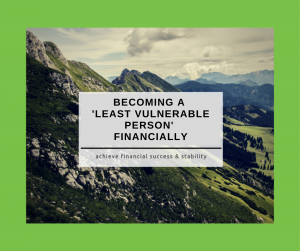Becoming a Financially ‘Least Vulnerable Person’
Becoming a Financially ‘Least Vulnerable Person’
When I wrote Stop Trying To Keep Up With The Joneses: They’re Broke Anyway, my primary goal was to dispel the common perception that wealth management and financial planning were the same things. It is during times such as we are experiencing now with the health crisis of COVID-19, that has impacted economies throughout the world. And it has now rippled into financial markets that understanding what it takes to be a financially least vulnerable person is so critical!
Most Americans understand wealth management – even if that isn’t exactly what they call it. It is the mix of the various assets you have – real estate, retirement plans, and investment portfolios. For many, they rely on the individual who manages their retirement plan or portfolio. And they consider that their financial plan. Nothing could be further from the truth! Wealth management is an important part of the overall plan, but it is only ONE part. To be truly financially least vulnerable, you need a holistic, coordinated, comprehensive financial plan.
The book is presented in three parts. In Part One, I cover the Success Fundamentals – the basis to becoming financially least vulnerable. I covered Part Two (The Six Big Risks) last month in the article: The 6 Biggest Risks To Your Retirement Future, and How To Avoid Them. Part Three is The Anatomy of a Financial Plan.
Let’s Cover Just a Few of the Success Fundamentals here:
A Basis for Sound Decisions: Articulating Values
Your life and your goals are uniquely yours. As important is the alignment of your values with those goals. Financial planning includes a fair number of calculations. What you want to achieve and why is always a higher priority than the math.
Creating a holistic, customized, comprehensive plan requires the coordination of multiple disciplines: investments, risk management, legal, and tax considerations to name a few. And most importantly a head coach to weave a thread of continuity between all of the disciplines: attorneys, accountants, insurance specialists, wealth managers, etc. This ensures that every decision you make is in complete alignment with your most important goals and your most deeply held values.
Reacting Can Hurt
Fear is a natural human emotion. Especially when you lack clarity and the confidence from having a written well-designed financial plan that you are executing. It is crucial that the financial plan is stress-tested for Bear Markets (among other risks that your plan faces).
Having this confidence, in both your plan and your team, allows you to focus on the things that are more important in life. Such as your human capital and social capital, and not just a focus on your financial capital.
Missing just a few days can drastically impact overall performance. During the period of 1990 to 2017, the S&P 500 returned 9.81%. Had you missed the best 15 single days, your return would have dropped to 8.21%. Had you missed the 25 best single days during that period, your return would have dropped to 4.53%. Those are huge differences, especially when you factor in the power of compounding.
Understanding Volatility
Volatility (and a lack of understanding volatility) is one of the elements that lead to the fear we discussed above. Which then causes you to potentially react improperly. It is important to understand that volatility exists in two directions – the upside and the downside. Additionally, you need to understand how to dampen volatility. No one ever complains about upside volatility. You know, what we all experienced during the longest bull run in history (March 9, 2009, to March 11, 2020). Interest tables and many financial calculators are based on zero volatility. Unfortunately, that is not the way economies or markets actually work – big corrections happen!
The Proper Emphasis
In their order of significance, the six elements of the success fundamentals:
Based on behavior (that you are in full control of):
- When and how early you start investing
- How often you invest
- The amount you invest
- Whether you stay invested or not
- How much you keep (avoiding tax erosion): taxable, tax-deferred, tax-free
Based on the industry and market conditions:
- Your rate of return (last on the list)
Stories of wealth are about behavior and choices, and a lot less about rate of return.
Focus on what you CAN control!
Since no one can reliably predict or forecast short-term movements in the financial markets, investors should focus on the things they CAN control. These things include, but aren’t limited to…
- Expenses
- Taxes
- Turnover
- Asset allocation
- Risk level
- Savings rates
- Withdrawal rates
While this can be intimidating, the good news is that you don’t have to do this alone!
Being a financially least vulnerable person simply requires some knowledge, commitment, and a team to help you navigate the ups and downs.
- SHARE THIS POST



